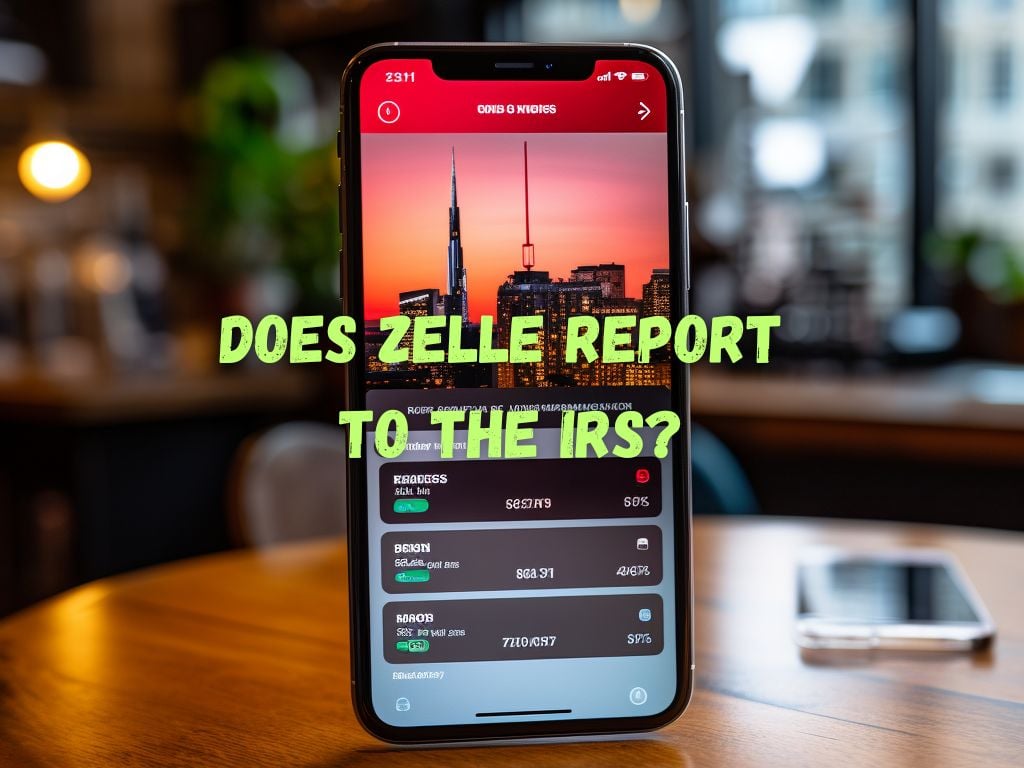Zelle is a popular payment app that enables users to send and receive money quickly and conveniently.
As the use of Zelle grows, users may have concerns about the app’s reporting obligations to the IRS.
In this article, we will delve into the question, “Does Zelle Report to the IRS?” and explore the tax implications of using this widely adopted payment app.
By understanding the IRS reporting requirements and knowing how to navigate them, you can ensure compliance and make informed financial decisions.
Does Zelle Report to the IRS?
There is often confusion surrounding whether Zelle reports transactions to the IRS.
According to Zelle’s official website, they do not issue Form 1099-K to users. However, it is crucial to understand that Zelle’s non-reporting stance does not absolve users of their personal tax reporting obligations.
The responsibility to report transactions to the IRS lies with the individual taxpayer.
Comparing Reporting Obligations with Other Payment Apps
While Zelle does not report transactions to the IRS, it is worth noting that other payment apps such as Venmo and PayPal may have reporting obligations.
For example, Venmo issues Form 1099-K to users who exceed certain thresholds in a calendar year. Therefore, it is essential to differentiate between payment apps and understand the reporting requirements associated with each.

Understanding IRS Reporting Requirements
The IRS requires certain transactions to be reported on Form 1099-K. This form is used to track payment transactions made through third-party settlement organizations (TPSOs) like Zelle.
It captures the gross payments received by users and helps the IRS track taxable income. However, not all transactions need to be reported. The IRS requires reporting only when the aggregate amount received through the TPSO exceeds specific thresholds.
Thresholds and Guidelines for Reporting Payments
To trigger IRS reporting requirements, the threshold for most TPSOs, including Zelle, is $20,000 in gross payments and 200 transactions in a calendar year. If you surpass both thresholds, you must file Form 1099-K with the IRS.
It is important to note that these reporting thresholds are subject to change, so it is essential to review the IRS guidelines regularly to stay updated.
Exemptions and Exceptions to Reporting Requirements
Certain types of transactions are exempt from reporting, even if the payment amount surpasses the thresholds.
These exemptions include payments processed through a registered payment processor or payments received as a bona fide gift.
Additionally, some states may have their own reporting thresholds, which may differ from the federal requirements.
Tax Implications of Zelle Payments
While Zelle’s non-reporting stance may seem advantageous at first, it is crucial to understand the tax implications for users.
Regardless of whether Zelle reports transactions, users are still responsible for reporting their income accurately to the IRS. Failure to do so can result in penalties and interest charges.
Reporting Responsibilities for Zelle Users
As a Zelle user, you must keep accurate records of your transactions and report the income earned through Zelle payments.
If you receive payments that exceed the IRS thresholds via Zelle, it is your responsibility to report them on your tax return. Consult with a tax professional to ensure compliance with reporting requirements.
Tax Deductions and Credits Related to Zelle Transactions
On the flip side, Zelle users may also be eligible for certain tax deductions and credits related to their transactions.
For example, if you use Zelle for business purposes, you can deduct eligible expenses associated with the transactions.
Additionally, if you receive payments for qualified education expenses through Zelle, you may be eligible for tax credits such as the American Opportunity Credit or the Lifetime Learning Credit.
Tax Planning Strategies for Managing Zelle Payments
To manage your Zelle payments efficiently and ensure compliance with IRS reporting requirements, it is crucial to implement effective tax planning strategies. Here are a few tips:
Maintain Accurate Records
Keep detailed records of your Zelle transactions, including dates, amounts, purposes, and the parties involved. This will help you accurately report your income and support any deductions or credits you may be eligible for.
Consult with Tax Professionals
Engage with tax professionals who can provide expert guidance and help you navigate the complexities of tax reporting and compliance. They can also help you identify potential deductions and credits related to your Zelle transactions.
Stay Updated with IRS Guidelines
IRS guidelines and reporting requirements can change over time. It is important to stay updated by regularly reviewing IRS publications, notices, and updates related to payment reporting.
Incorporate Zelle into Overall Financial Planning
Integrate your Zelle transactions into your overall financial planning process. Consider how Zelle payments may impact your income and budgeting, and adjust your financial goals accordingly.
Pro Tips for Zelle Users
Organize and categorize your Zelle transactions:
Create a system to organize and categorize your Zelle transactions. This can include using labels or tags to differentiate between personal and business transactions, tracking recurring payments, or separating transactions based on the purpose (e.g., rent, utilities, groceries).
This will simplify the process of identifying and reporting income accurately during tax filing.
Utilize expense-tracking apps:
Consider using expense-tracking apps that integrate with Zelle, allowing you to automatically categorize and track your transactions.
These apps can provide real-time insights into your spending patterns, simplify record-keeping, and generate reports that may be helpful when preparing your taxes.
Understand deductible expenses:
If you use Zelle for business purposes, familiarize yourself with the deductible expenses that may be associated with your transactions.
For example, if you receive payments for freelance work or sell products, you may be eligible to deduct expenses such as supplies, equipment, or business-related subscriptions.
Consult with a tax professional to ensure you are claiming all eligible deductions.
Automate the record-keeping process:
Consider setting up automation for your record-keeping. Many accounting and personal finance software platforms offer integrations with Zelle, allowing you to sync your transactions automatically.
Automating the process saves time and reduces the likelihood of missing important information when tracking your Zelle transactions.
Review your tax situation periodically:
Regularly review your tax situation and consult with tax professionals. Tax laws and regulations are subject to change, so it’s important to stay informed about any updates that may impact the reporting requirements for your Zelle transactions.
A tax professional can provide personalized guidance based on your specific circumstances and help you optimize your tax situation.
By following these pro tips and best practices, Zelle users can streamline the management of their transactions, ensure accurate reporting, and stay compliant with IRS regulations.

Frequently Asked Questions (FAQs)
1. Does Zelle issue Form 1099-K to users?
No, Zelle does not issue Form 1099-K to its users. Since Zelle acts as a facilitator between parties in a transaction, it does not meet the criteria for reporting transactions to the IRS.
However, it is important to note that while Zelle does not provide Form 1099-K, users are still responsible for accurately reporting their income to the IRS.
2. How can I track my Zelle transactions for tax purposes?
To track your Zelle transactions for tax purposes, it is important to maintain accurate records. Keep a record of the date, amount, purpose, and parties involved in each transaction.
You can create a spreadsheet, use personal finance software, or utilize mobile apps that categorize and track your transactions. By documenting your Zelle transactions, you can easily provide supporting documentation if needed during tax filing.
3. Are there any penalties for not reporting Zelle transactions?
Yes, there can be penalties for failing to report Zelle transactions and other income to the IRS.
If the IRS discovers unreported income during an audit or examination, you may face penalties, interest charges, and potential legal consequences. It is advisable to comply with reporting requirements and consult with a tax professional to ensure accurate reporting and compliance.
4. Can Zelle account transactions be audited by the IRS?
Yes, Zelle account transactions can be subject to IRS audits. The IRS has the authority to audit taxpayers’ financial records, including Zelle transactions, to verify the accuracy and completeness of reported income.
Therefore, it is crucial to maintain accurate records of your Zelle transactions and follow proper tax reporting procedures to avoid any issues during an audit.
Conclusion
In conclusion, while Zelle does not report transactions to the IRS, Zelle users are responsible for reporting their income accurately.
Understanding IRS reporting requirements, thresholds, and exemptions is crucial for compliance.
By keeping accurate records, consulting with tax professionals, and staying updated with IRS guidelines, Zelle users can navigate the tax implications of using this popular payment app.
Stay informed, plan accordingly, and make sound financial decisions to ensure compliance with tax reporting obligations.


 Tags:
Tags:










